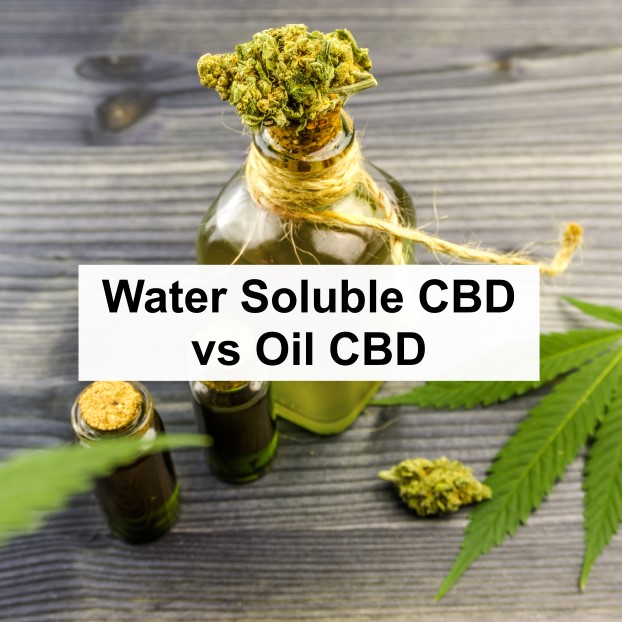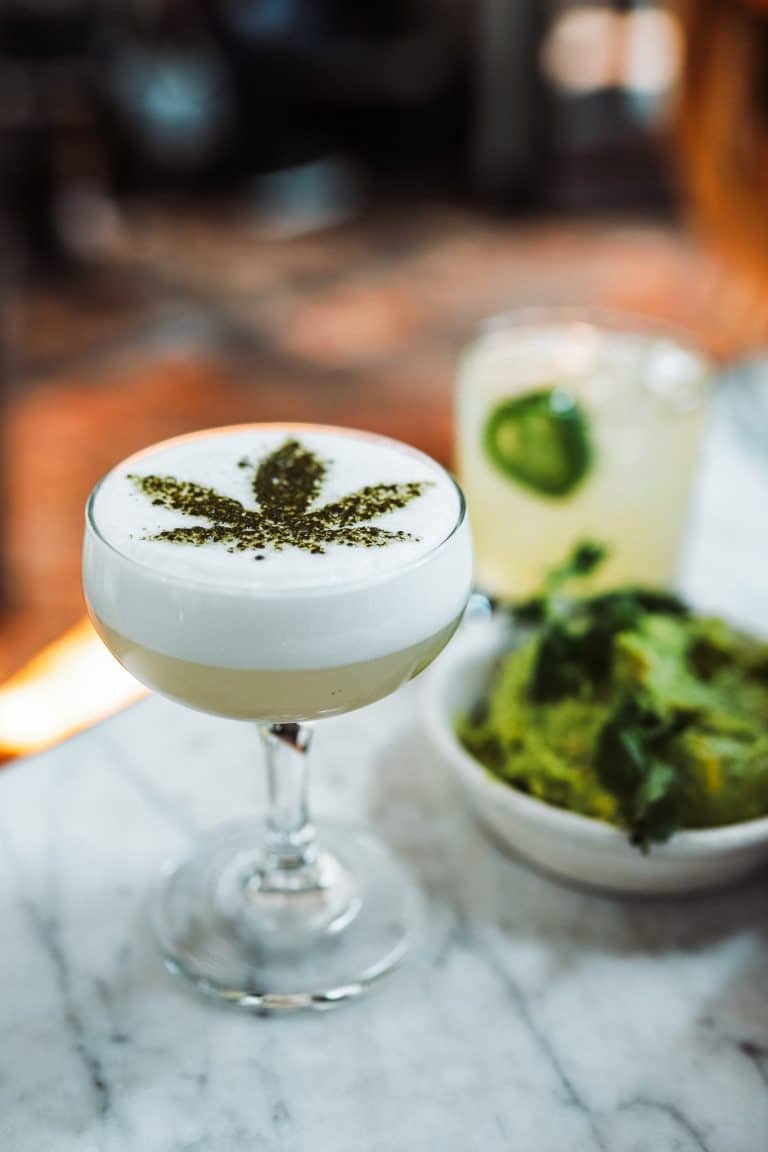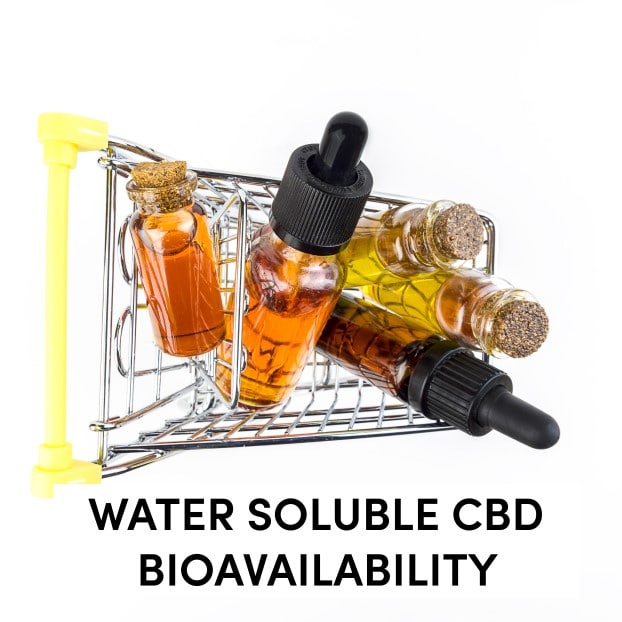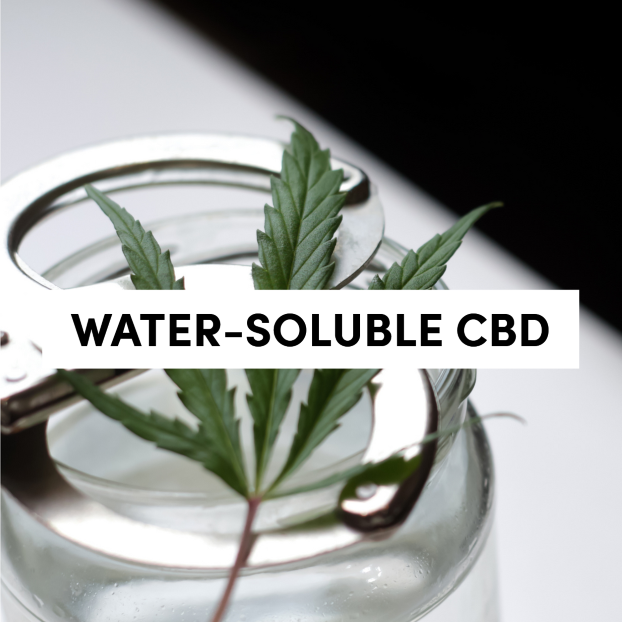Water Soluble CBD vs Oil CBD

Posted on March 5th, 2021
Cannabidiol, or CBD for short, is an abundantly present active compound of the cannabis plant. Cannabis is a rather large family of plants with many varieties, of which two are marijuana and hemp. Marijuana, the most notorious out of the two, features abundant CBD, yet, it also has even higher levels of THC, a psychoactive compound. THC is the very thing responsible for the fact that ingesting marijuana gets you high.
The hemp plant, however, has the particularity of having incredibly low levels of THC but retains high levels of CBD. So, CBD will not get you high since manufacturers choose to extract it from hemp, leaving it with next to no THC. The most famous CBD product is by far CBD oil. Due to the fact that oil is not water soluble, there were ongoing efforts aimed at changing that to make CBD even more absorbable for your body. The result was water soluble CBD, and it might just be a gamechanger. How does the water soluble CBD vs oil CBD fight resolve? Is one product better than the other? Let’s find out.
CBD Health Benefits?
Believe it or not, CBD is becoming a very strongly advocated alternative supplement for people managing several conditions. One particularly important group of advocates seem to be doctors treating childhood epilepsy. The compound shows incredible potential when it comes to managing epileptic seizures. So much so that the FDA already approved the first, and most likely not the last, medication containing CBD – Epidiolex. Of course, that is but one of CBD’s potentially therapeutic applications. You don’t need to suffer from epilepsy specifically to derive benefit from CBD.
CBD shows a high potential to address anxiety, insomnia, and depression. Enthusiasts agree on the fact that taking CBD delivers them a sense of calmness once it takes effect. This is particularly great for anxiety-stricken people who could always use a hand to take things easy. Likewise, depression sufferers report that the relative calmness serves them as a bit of pick-me-up. Also, insomniacs allege that taking it before bed helps them get a good night’s sleep.
And still, that is not all CBD has to offer. The compound might also provide pain relieving effects. CBD apparently has the ability to numb pain sensation somewhat while also decreasing inflammation in your body. Taking regular doses of it might help with inflammatory, chronic, and neuropathic pain, the last two of which are otherwise difficult to treat. But don’t just take the word of enthusiasts for that; check some of the scientific research that backs them up.
Most states now legally allow the use of CBD products, and more studies and research are on the way to uncover more about CBD. One said research ended up creating water soluble CBD and starting the water soluble CBD vs Oil CBD debate.
Safety of Use
Unlike its psychoactive cousin, THC, CBD is non-psychoactive; thus, it cannot get you high no matter how much you take. It does, however, have some side effects but rest assured, they are much milder than those of prescription medications. If you happen to take inordinately large amounts of CBD, you might experience:
- Drowsiness
- Diarrhea
- Dry mouth
- Lack of appetite
Again, this only happens if you take a lot of the compound in a short amount of time. The FDA is yet to release an actual recommended dosage for CBD. This led to the correct doses remaining vague and more a matter of personal tolerances. The usual recommendation is to start low and go increasing until you hit a sweet spot where you feel the most benefits and no discomfort.
As to the quality of the CBD product, better do a background check on each manufacturer. Look for them online. Most manufacturers display third-party lab results either on their label, on their website, or both.
The test results certify the purity of the compound; if a manufacturer does not make them readily available, that’s a red flag. It’s also a good idea to look for reviews of the product online. Most CBD enthusiasts are quite vocal about their experiences; you can trust the crowd on this one. That remains true about water soluble CBD vs Oil CBD products as well.
CBD Extraction
The production of CBD oil and its supplements requires extracting the cannabinoid from the plant materials. There are many methods doing this, each of them having its own characteristics and techniques.
Solventless extraction by hand uses heat, pressure, and friction applied to the hemp flowers and leaves. It is also possible to freeze hemp flowers and shake the trichomes loose. Those are the elements of hemp that have the full spectrum of cannabinoids. It is the cheapest form of extraction and makes use of the complete hemp plant. However, yields remain low. There is also no control on purity, and the extract contains some undesired plant material that does not enhance CBD effects at all.
Some extraction processes make use of olive oil. The acidic cannabinoids first require activation through the use of heat. They then mix the plant matter with olive oil and heat it for several hours. The CBD cannabinoid will bind to the fats, and then the heated product goes through filtering after they cooled it down to remove plant material. The process is safe and gives a higher degree of purity to the final product.
Solvent extraction is the process used for CBD extraction, which has the widest commercial use than any of the other variations. It uses liquid solvents applied to the processed hemp after it underwent heating and decarboxylation.
Solvents used are butane, ethanol, and hexane, and these require evaporation after the extraction completes. The use of CO2 in a supercritical state gives it the characteristics of both liquid and gas. Pumping this through the hemp plant extract in a controlled fashion results in stripping the extract of all its terpenes and cannabinoids. The concentrates thus obtained are clean, safe, and yield efficient, while the process itself is environmentally friendly and sustainable. It is an expensive industrial process that requires expertise for its correct performance.
Water Soluble CBD
In order to make water soluble CBD, it’s necessary to break down its cannabidiol molecules into nanoparticles. These CBD particles are so tiny that they can undergo a process of nanoemulsification. That ends up infusing them into a liquid form which, unlike CBD oil, actually dissolves in water. As a result, the body might absorb CBD almost as easily as it absorbs water which means its effects will kick in much faster. Also, water soluble CBD has a higher bioavailability than regular CBD oil. That means that more of the compound will get into your body. The process of creating nanoparticles is nothing new; pharmaceuticals have been using it for years to deliver chemical molecules to the body.
Manufacturers create CBD that is water soluble simply to offer you a faster-acting, more potent alternative to CBD oil. Additionally, it also makes CBD easier to add to beverages and other liquids, so quite a nice list of perks all in all.
The making of water soluble CBD is an intensive and expensive process. Thus, not easy for most manufacturers of CBD to come up with the product, so few produce it so far.
The Benefits of Water Soluble CBD vs Oil CBD
Water and oil do not mix, and this also remains true of CBD oil. As a result, when consumed in its normal form, this oil is not as easy for the body to absorb as water is. So, the body will absorb a water soluble CBD easily absorbed which will help deliver the therapeutic effects faster.
The composition of our body is largely water which means that water soluble CBD has a large pool in which to dissolve into. Thus, it has much more bioavailability, how much of the compound actually makes it into the body, than CBD oil. Most put the bioavailability of CBD oil between 13% to 19%. For comparison, vaping the CBD oil allows up to around 60% bioavailability.
How much bioavailability does water-soluble CBD have? We simply have no studies to say as of right now. What we do know it’s the percentage is considerably higher than for traditional CBD oil based on the online reports of enthusiasts.
One thing to consider, though, since water soluble CBD oil is, well, water soluble, your body treats it the same as the water you drink. Meaning, you will excrete it through urine just like it does to water. Thus, water soluble CBD oil remains for less time in your body than regular CBD oil.
Much faster, stronger effects, yet, for a shorter duration. That is one interesting point to keep in mind when it comes to the whole water soluble CBD vs oil CBD debate. Choose whichever fits best the purpose you have in mind when it comes to taking CBD.





